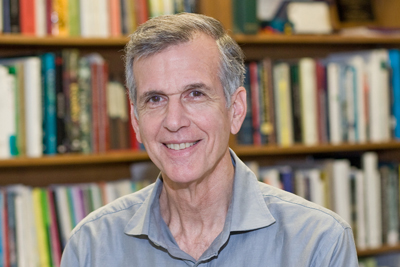
UMSL biologist Robert Ricklefs recently co-wrote a Science journal article about his findings that confirm competition – and not randomness – plays a central role in the makeup of the earth’s forests. (Photo by August Jennewein)
Up until Jan. 27, ecologists were still arguing about the factors that determine the makeup of the earth’s forests. And then an article in the prestigious journal Science discussed findings that put “a nail in the coffin” of the increasingly popular so-called neutral theory in ecology, according to the article’s authors.
Robert Ricklefs, Curators’ Professor of Biology at the University of Missouri–St. Louis, along with his colleague Susanne Renner, professor of biology at Ludwig Maximilians University of Munich and ecological diversity director of the Botanic Garden and Herbaria in Munich, are the scientists behind this dramatic finding.
By analyzing data from censuses of trees in the species-rich rainforests of Africa, Asia, and Central and South America, as well as comparing those findings with 55- to 65-million-year-old fossils from similar forests in South America, they believe they laid to rest one of the “important processes that has been proposed to explain patterns of diversity,” Ricklefs said. Their findings were published Jan. 27 in Science, the academic journal of the American Association for the Advancement of Science.
Ricklefs and Renner’s research shows that “species’ and individuals’ particular evolutionary lineages are highly correlated on all three continents,” Ricklefs said. “If a family of trees, such as the legumes, is abundant in Asia, then it is likely to be abundant in Africa and South America. If it is uncommon in one, then it is most likely uncommon in the others.”
Their findings contradict American ecologist Stephen Hubbell’s unified neutral theory of biodiversity and biogeography, which has attracted a sizable following of ecologists over the last decade.
This group of what Renner calls “influential” ecologists “postulate that random fluctuations in population size and probabilities of species production and dispersal play the dominant role,” in those tropical forests, she said.
“There is a very definite process that leads to abundance and it is deterministic, not random,” said Ricklefs. “Diversity is a central issue in ecology. Neutral theory predicts that the relative abundance of evolutionary groups should be unpredictable across regions. Looking at large-scale patterns across millions of years of evolution and diversification clearly allows us to reject neutral interpretations. I believe that’s why Science found our research compelling.”
Ricklefs is the author of four books, more than 80 articles and nearly 300 papers in peer-reviewed international journals. In 2009 he was elected to the National Academy of Sciences, the only academic from Missouri to do so that year.














